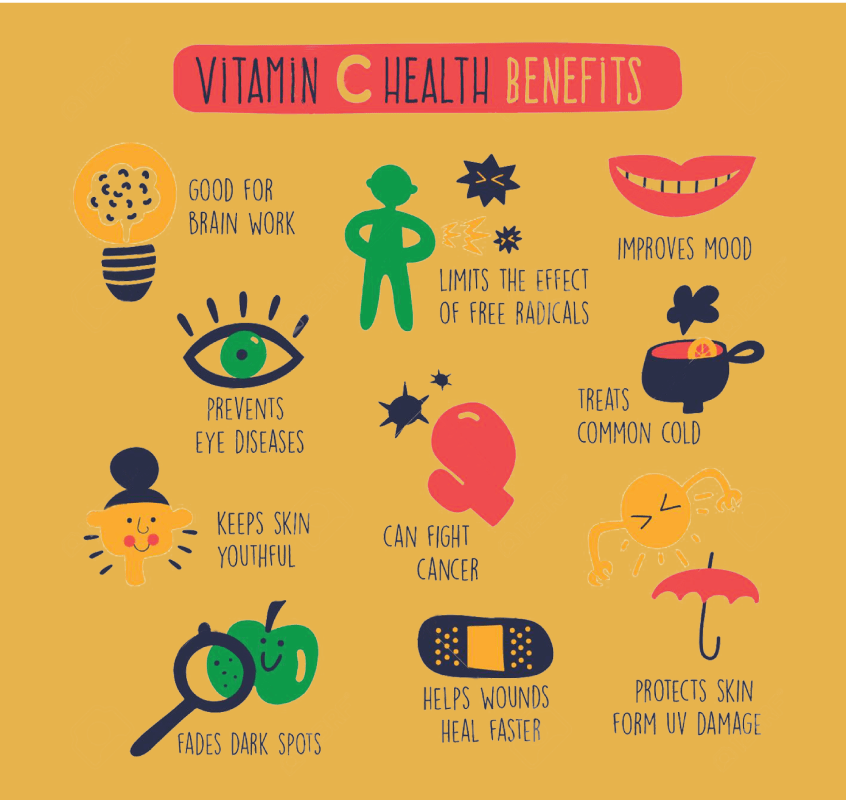Vitamin C is an essential vitamin, meaning your body can’t produce it. It has many roles for all genders but it has been linked to impressive health benefits for women.Vitamin C, also known as Ascorbic Acid, is necessary for the growth, development and repair of all body tissues. It’s involved in many body functions, including formation of collagen, absorption of iron, the proper functioning of the immune system, wound healing, and the maintenance of cartilage, bones, and teeth.
Below are scientifically proven benefits of taking a vitamin C supplement for women’s health:
Vitamin C – Enhance Iron Absorption
Iron is a mineral that supports proper growth and development, aids the body’s ability to deliver oxygen throughout the body. Your body uses iron to make hemoglobin, a protein in red blood cells that carries oxygen from the lungs to all parts of the body, and myoglobin, a protein that provides oxygen to muscles. Your body also needs iron to make some hormones.Vitamin C has been shown to enhance iron absorption. Vitamin C assists in converting iron that is poorly absorbed, such as plant-based sources of iron, into a form that is easier to absorb. This is especially useful for vegan people or those on a meat-free diet, as meat is a major source of iron. In fact, simply consuming 100 mg of vitamin C may improve iron absorption by 67% . As a result, vitamin C may help reduce the risk of anemia among people prone to iron deficiency.
Vitamin C – Stimulates Collagen Synthesis
Collagen is a protein your body makes naturally, also called “the glue that holds the body together”. Collagen’s strong fibers work like glue to hold things together in your body: muscles, bones, tendons, ligaments, organs, and skin. Specially, it’s essential for healthy joints, strengthens blood vessels and gives skin its elasticity and strength.Collagen production decreases as we age. After the age of 20, a person produces about 1 percent less collagen in the skin each year. The skin becomes thinner, drier, and less elastic. The loss of collagen leads to wrinkle formation.Vitamin C is absolutely essential for synthesis of collagen. The main cutaneous collagens are types I and III, which are less synthesized with aging. Vitamin C is one of the main promotors of collagen formation and prevent dryness, wrinkles, and other signs of aging.
Vitamin C – Manage High Blood Pressure
The link between vitamin C and mood might seem surprising, but people who have vitamin C deficiency often feel fatigued or depressed. Vitamin C supplementation attenuates the increases in circulating cortisol and adrenaline then may improve your mood and reduce anxiety.Besides Vitamin C may act as a diuretic, removing excess fluid from your body. This may help lower the pressure within your blood vessels. According to scientists from Johns Hopkins University School of Medicine, taking vitamin C supplements at a dose of about 500 milligrams a day may produce small reductions of blood pressure.
Vitamin C – Pregnancy And Breastfeeding Women
Vitamin C is important for a healthy immune system, and during pregnancy it helps you and your baby make collagen for your tendons, bones, and skin. When a mother takes Vitamin C in her diet, there is an increase of the vitamin in her breast milk within 30 minutes of her taking it. Her breast milk supply may increase, and for mothers who are already healthy, it will aid them to provide a steady flow of breast milk. When working together with Vitamin E, Vitamin C can have a very positive effect on breast milk as it improves the antioxidant levels in it, which then get passed on to their babies. According to the Drugs and Lactation Database, you can take a high daily dose of 1,000 milligrams without any adverse effects for you or your baby
Vitamin C – Reduce The Risk Of Heart Disease
Vitamin C supplements have been linked to a reduced risk of heart disease. These supplements may lower heart disease risk factors, including high blood pressure, high triglyceride or LDL (bad) cholesterol levels, and low levels of HDL (good) cholesterol. Interestingly, another analysis of 15 studies found that consuming vitamin C from foods — not supplements — was linked to a lower risk of heart disease.However, scientists were unsure whether people who consumed vitamin-C-rich foods also followed a healthier lifestyle than people who took a supplement. Thus, it remains unclear whether the differences were due to vitamin C or other aspects of their diet. However, it’s surely that consuming at least 500 mg of vitamin C daily and follow a healthy lifestyle may reduce the risk of heart disease.
Vitamin C – Menstruation Function
Menstruation, or period, is normal vaginal bleeding that occurs as part of a woman’s monthly cycle. During the monthly menstrual cycle, the uterus lining builds up to prepare for pregnancy. If you do not get pregnant, estrogen and progesterone hormone levels begin falling. Very low levels of estrogen and progesterone tell your body to begin menstruation. When you menstruate, your body discards the monthly buildup of the lining of your uterus (womb). The menstrual blood is partly blood and partly tissue from inside the uterus.
Vitamin C can elevate your estrogen levels and lower progesterone levels. This causes the uterus to contract and the lining of the uterus to break down, leading to the onset of menstruation.
Vitamin C – Boost The Immunity
Vitamin C contributes to immune defense by supporting various cellular functions of both the innate and adaptive immune system. Vitamin C supports epithelial barrier function against pathogens and promotes the oxidant scavenging activity of the skin, thereby potentially protecting against environmental oxidative stress.
You may have noticed the vitamin C has been looking for these days as it can help with COVID-19. However, no supplement including vitamin C can prevent or treat COVID-19 but actually Vitamin C does strengthens your immunity and make your defenses as strong as possible.
Vitamin C affects your immune health in several ways. Its antioxidant activity can decrease inflammation, which may help improve your immune function. Vitamin C may help prevent viral, bacterial and other infections by shortening the duration of colds and acting as a natural antihistamine and anti-inflammatory.
Vitamin C is a water-soluble vitamin, which means it dissolves in water. Frequently eating foods high in vitamin C should not lead to any health issues. Taking too much vitamin C through supplements can, however, cause side effects. In adults, the recommended dietary allowance (RDA)Trusted Source of Vitamin C is 90 milligrams (mg) for males and 75 mg for females (roughly 120 mg per day for women who are pregnant or breastfeeding). Although too much dietary vitamin C is unlikely to be harmful, megadoses of vitamin C supplements might cause:
- Diarrhea
- Nausea
- Vomiting
- Heartburn
- Abdominal cramps
- Headache
- Insomnia
On the other hand, Vitamin C deficiency can occur as part of general undernutrition, but severe deficiency (causing scurvy) is uncommon. The most common risk factors for vitamin C deficiency are poor diet, alcoholism, anorexia, severe mental illness, smoking and dialysis.Since the body does not store large amounts of vitamin C, it is recommended to eat fresh fruits and vegetables every day. Vitamin C rapidly breaks down when exposed to heat, so raw fruits and vegetables are better sources than cooked food.
Sources: Healthline; webmd; everydayhealth; womenhealthmag.
 Kamila Sporty – Áo Tập Thể Thao Nữ Năng Động, Chất Lượng Cao | JOYLYAN ACTIVE
1 × 539.000 ₫
Kamila Sporty – Áo Tập Thể Thao Nữ Năng Động, Chất Lượng Cao | JOYLYAN ACTIVE
1 × 539.000 ₫ Croptop Aluna – Áo Sportswear Nữ Năng Động, Thoải Mái & Thời Trang | JOYLYAN SPORTSWEAR
1 × 648.000 ₫
Croptop Aluna – Áo Sportswear Nữ Năng Động, Thoải Mái & Thời Trang | JOYLYAN SPORTSWEAR
1 × 648.000 ₫ Croptop Delia – Áo Sportswear Nữ Năng Động, Thoải Mái & Thời Trang | JOYLYAN SPORTSWEAR
1 × 399.000 ₫
Croptop Delia – Áo Sportswear Nữ Năng Động, Thoải Mái & Thời Trang | JOYLYAN SPORTSWEAR
1 × 399.000 ₫
 Kamila Sporty – Áo Tập Thể Thao Nữ Năng Động, Chất Lượng Cao | JOYLYAN ACTIVE
Kamila Sporty – Áo Tập Thể Thao Nữ Năng Động, Chất Lượng Cao | JOYLYAN ACTIVE  Croptop Aluna – Áo Sportswear Nữ Năng Động, Thoải Mái & Thời Trang | JOYLYAN SPORTSWEAR
Croptop Aluna – Áo Sportswear Nữ Năng Động, Thoải Mái & Thời Trang | JOYLYAN SPORTSWEAR  Croptop Delia – Áo Sportswear Nữ Năng Động, Thoải Mái & Thời Trang | JOYLYAN SPORTSWEAR
Croptop Delia – Áo Sportswear Nữ Năng Động, Thoải Mái & Thời Trang | JOYLYAN SPORTSWEAR 
